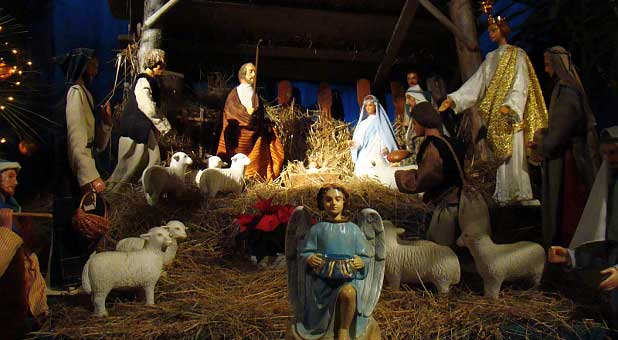Luke gives us a beautiful glimpse of the entrance of the God-man, Yeshua, into earthly life. It was a glorious moment, no matter when it took place:
“And there were shepherds living out in the fields nearby, keeping watch over their flocks at night. An angel of the Lord appeared to them, and the glory of the Lord shone around them, and they were terrified. But the angel said to them, ‘Do not be afraid. I bring you good news that will cause great joy for all the people. Today in the town of David a Savior has been born to you; he is the Messiah, the Lord. This will be a sign to you: You will find a baby wrapped in cloths and lying in a manger’” (Luke 2:8-12, NIV).
Every now and then I come across a passage and I think to myself, “Oh, how I wish I was there!” Acts 2, the road to Emmaus, the Exodus and this one. Jewish shepherds are watching over their sheep at night when suddenly an angel appears to them, announcing the birth of the Messiah.
But notice the angel’s words. This is a Jewish story.
1. He says this will “cause great joy for all the people.” What people? The people of Israel, of course. And we see this great joy manifested in Jerusalem in Acts 2, when the Holy Spirit is poured out, and we will see it again in the end-time revival that is sure to touch Israel (Rom. 11:26).
2. He says the baby has been born not in Rome nor in Antioch but in Bethlehem, presently a PLO-controlled city next to Jerusalem (as an Israeli, I can’t even visit the city if I wanted to) but once a completely Jewish town, home to the young shepherd David. David was a type of the Messiah, and the prophets foretold that while the Messiah would minister in Galilee (Is. 9:1-2), He would be born in the Bethlehem:
“But you, Bethlehem Ephrathah, though you are small among the clans of Judah, out of you will come for me one who will be ruler over Israel, whose origins are from of old, from ancient times” (Mic. 5:2).
3. Next, the angel does not announce the coming of a new religion called Christianity that will one day be based in Rome but simply says that the One the Hebrew prophets spoke of has come, the Messiah. For Jews, to believe in this prophesied Messiah certainly did not mean changing religions. In fact, when Gentiles began to believe in the Jewish Messiah, the Jews’ first reaction was, “OK, let’s get you guys circumcised and converted to Judaism.” They did not understand that Gentiles could come to the Jewish Messiah without first becoming a convert to Judaism. It was a revelation to Simon Peter in Acts 10 that ultimately became doctrine in Acts 15. Now, as the one new man (Eph. 2:15) made up of Jew and Gentile, together we worship the Messiah of Israel.
Yes, Christmas, or Messiahmas, is a Jewish story indeed.
Ron Cantor is the director of Messiah’s Mandate International in Israel, a Messianic ministry dedicated to taking the message of Jesus from Israel to the ends of the earth (Acts 1:8). Cantor also travels internationally teaching on the Jewish roots of the New Testament. He serves on the pastoral team of Tiferet Yeshua, a Hebrew-speaking congregation in Tel Aviv. His newest book, Identity Theft, was released April 16. Follow him at @RonSCantor on Twitter.
For the original article, visit messiahsmandate.org.











































